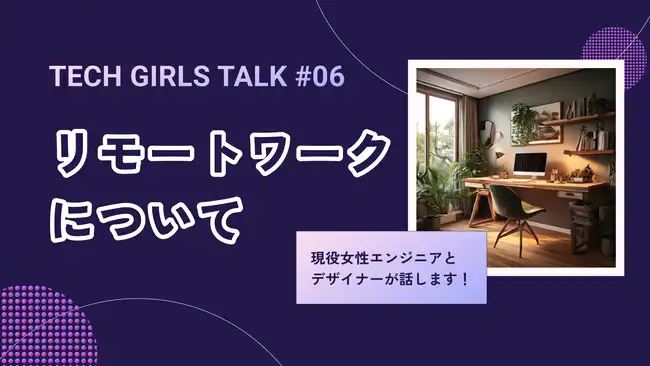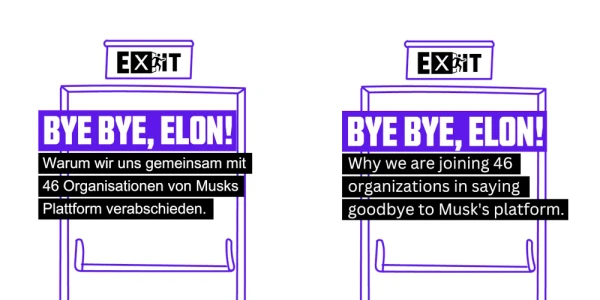The Reality and Potential of Remote Work【TECH GIRLS TALK 6】
An episode where an engineer and designer discuss the effects and challenges of remote work. Explaining productivity improvement data from Stanford research and CEOs' concerns, illuminating the pros and cons based on real experiences. We explore the possibilities of diverse work styles through efficient tool introductions and personality-based suitability differences.
3/13/2025

In the sixth episode of TECH GIRLS TALK, designer Mari and engineer Sawako discussed "remote work." Three years after the pandemic, as many companies reassess their work arrangements, this topic remains relevant to many people.
Remote Possibilities: A Soft Serve Ice Cream Tour
The show began with an unexpected topic. Sawako shared her dream of "touring service areas across Japan to compare different soft serve ice creams." This idea connected to how remote work could make such dreams possible.
"Working while traveling around tasting unique flavors like lotus leaf soft serve from different regions"
Can you see how location-independent work opens up possibilities for everyday dreams like this?
Productivity Gains Backed by Data
Mari introduced a Stanford University study showing that remote work increased productivity by approximately 13%.
The reasons included:
- Reduced break times
- Better concentration in quiet environments
- Employees having choice in their work arrangement
Particularly noteworthy is the effect of "having a choice." The research indicates that allowing workers to choose their environment is more important than the company making unilateral decisions.
Why Are CEOs Pushing for Office Returns?
However, according to an article Sawako shared, 79% of CEOs at large companies predict "remote work will decline within three years." Why is this?
"They're trying to lure employees back by offering better promotions, salary increases, and various perks to those who come into the office"
The pair analyzed this contradiction, discussing how corporate culture and real estate markets play a role. How does your company approach this issue?
Personal Experiences: The Light and Shadow of Remote Work
Sawako's Experience
- In the office, colleagues asking "How are you? What are you doing?" disrupted her concentration
- Remote work meant "no interruptions" and increased efficiency
- No time wasted on commuting
Mari's Experience
- Previous job was half remote, half in-office
- Office chatter often included "trivial topics" that slowed progress
- After marriage, no commute made work-life balance much easier
Both experienced productivity improvements, though they note this depends on personality and environment.
New Focus from Changing Environments
One fascinating insight was how working in different environments boosted focus.
Mari lives in the UK but sometimes works from her husband's home country or other European nations, noting: "Working in a different country feels strange but actually improves my concentration."
Sawako shared that "at my family home in America, jet lag wakes me at 4:30 AM, and I work while everyone else is sleeping." Both agreed that environmental changes can bring fresh energy to work.
Have you ever tried working from a different environment?
Suitability Based on Generation and Personality
The pair pointed out that remote work affects people differently:
- It suits those who excel at self-scheduling
- Young professionals might need office experience
- Their colleague K lives in a shared house, maintaining social connections while working remotely
Rather than an all-or-nothing approach, isn't providing options based on individual needs more important?
Tools Supporting Remote Work
They also shared tools they've used for efficient remote work:
Chat tools: Slack, Discord, Microsoft Teams, Google Chat
Task management: Jira, GitHub Issues, Linear, Monday
Document sharing: Google Workspace, Microsoft Office
Interestingly, Mari confessed anxiety about GitHub: "What if I accidentally delete something?" This highlights how everyone has different comfort levels with technology.
The Annual "Olympics"
Their discussion revealed that even fully remote companies sometimes gather annually:
"Once a year, we all meet in Tokyo for a special event. Everyone exchanges souvenirs from their hometowns..."
This hybrid approach might provide clues for future work models.
Conclusion: The Value of Choice
Their ultimate conclusion emphasized the importance of choice.
"Having options is best. I'm more efficient remotely, but others aren't" (Sawako)
"Some people want frequent meetings, while others are fine with once a year" (Mari)
Work styles need diversity, with arrangements tailored to individuals. Isn't this perspective essential in contemporary society?
What's your ideal work arrangement? Please share in the comments!
References
- Inc.com – Why CEOs Predict a Decline in Remote Work
- Hacker News – Discussion about Remote Work
- NHK – Remote Work Related Article
Episode 6 Links
- Spotify: TECH GIRLS TALK Ep6
- Apple Podcasts: TECH GIRLS TALK Ep6
- YouTube: TECH GIRLS TALK Ep6
YouTube トランスクリプト
English Translation of the Transcript
0:02: Welcome to Tech Girls Talk. In this radio show, female engineers and designers working in tech companies discuss trending technologies and AI news.
0:12: I'm Mari, the designer. I'm Sawako, the engineer.
0:19: So here we are again this week. Nice to meet you. Nice to meet you too. This is already Episode 6.
0:30: Time flies! Yes, this week we have a slightly less technical, lighter topic.
0:35: That's right. It's something that many people are probably thinking about these days - work styles.
0:44: That's true. This topic comes up a lot in Japanese news as well.
0:54: Before we get into today's topic, let me share a little story.
1:01: Actually, I really love soft serve ice cream. That's nice! I prefer soft serve over regular ice cream.
1:12: And in Japan, you can eat soft serve anywhere, right? Yes, there are so many places.
1:19: Especially at service areas and parking areas along highways, they mix in local specialties and create unique flavors.
1:32: I once tried one that I think was lotus leaf flavor at some service area. It was unimaginable - they mixed powdered lotus leaves into the soft serve.
1:47: It looked appealing with a light green color and looked really pretty, so I wanted to try it. But when I ate it, I couldn't really taste much difference. It just tasted like regular soft serve.
1:59: I see. There are flavors like salt that taste a bit salty, or caramel that tastes like caramel, grape, and various others. But with lotus, I don't know what lotus leaf itself tastes like, so I couldn't tell what was the lotus flavor and what was the original ice cream flavor.
2:17: What I really want to say is that I'd love to drive from north to south or south to north across Japan visiting these service areas and parking areas.
2:34: But that would take many days, and this is where remote work - today's topic - comes in. I think this could be possible with remote work.
2:40: That's true. You see YouTubers traveling while working. Plus, service areas and parking areas have good internet connections.
2:55: I used to give guidance at service areas, and there used to be late-night discounts and weekend discounts that made highway tolls cheaper depending on when you entered.
3:14: So using those discounts while checking the timing, traveling on highways all day, stopping at service areas to eat different soft serve flavors and maybe blogging about them could be interesting.
3:30: That sounds so fun! I'd love to see you do that. It really does sound fun. We recently got a dog, so I'm thinking maybe our family could all go together.
3:43: That would be great! It sounds like a lot of fun. Japan has so many types of soft serve.
3:49: Japanese roadside stations are also famous. Yes, they sell vegetables and other things. It's amazing.
4:02: They're beautiful and delicious. When you come back to Japan, please visit service areas, parking areas, and roadside stations.
4:17: But I need to plan carefully - what hours I'll work, what hours I'll drive, and so on.
4:33: So today's topic is remote work.
4:44: Our company is currently fully remote, with all employees working remotely.
4:52: So I'd like to talk about that later. First, I'll introduce an article.
5:00: This is about Stanford research on the work-from-home experiment.
5:07: This Stanford research examined the effects of remote work on employees of Ctrip, a Chinese travel agency.
5:14: The results showed that employees who worked from home had about a 13% increase in productivity, higher job satisfaction, and lower turnover rates.
5:30: The main factors for productivity improvements were reduced break time and better concentration in quiet environments.
5:41: However, despite good performance, remote workers showed a tendency for lower promotion rates. After giving all employees the option of working from home, productivity increased further, showing the importance of employee choice.
5:56: The main measurement methods: productivity was measured by objective indicators like call numbers and customer service times, satisfaction was measured through surveys, and turnover was measured by employee resignation rates.
6:14: After the success of the initial experiment, Ctrip offered all employees the work-from-home option. This additional experiment examined the impact on productivity when employees made their own choices.
6:37: In summary, this Stanford research showed that working from home increased productivity by about 13%, improved satisfaction, and decreased turnover - all positive results.
6:52: However, there are also views that remote work will decrease in the future. Sawako will introduce that perspective.
7:06: This article from Inc.com predicts that about 79% of remote work will decrease within 3 years.
7:24: This is what CEOs of large companies are predicting. Why do CEOs think that about 80% of remote work will disappear?
7:44: The CEOs of these large companies are trying to bring employees back to the office, creating company cultures and environments that make remote work difficult.
8:05: One typical approach is that these CEOs and top executives give better promotions, higher salaries, and improved employee rankings to those who come to the office.
8:32: They're favoring office workers with various benefits to encourage everyone to return to the office, though employees might feel they have no choice.
8:49: Not all CEOs think this way. Companies like Asana have embraced remote work and found success with it, so they're continuing with remote work.
9:06: Why are these CEOs trying so hard to bring employees back when experiments show a 13% increase in productivity? This has become a big topic of discussion.
9:30: Our company is fully remote. Sawako, is this your first fully remote company?
9:36: Actually, my previous company also became fully remote because of COVID, and they decided to continue with remote work even after COVID.
9:57: To be honest, I feel like I did less work when I was going to the office. At my previous workplace, many people would come to the IT department.
10:19: Especially non-IT people would come by saying "How are you?" particularly in America where I worked. Americans are very friendly.
10:38: The employees around me were very kind people. They'd come to the office saying "How are you? Are you okay? What are you doing?" and start conversations.
10:52: This would interrupt my work. Not just colleagues at my level, but even my boss would do this often.
11:02: I had to tell him "Could you maybe come once every two hours instead? When you come too often, I can't concentrate." That's how much he would visit.
11:16: So when we went remote, my efficiency improved a lot. No interruptions, the bathroom is right there, coffee is at home, and I don't need to go for walks.
11:33: I found that I could concentrate better in a remote environment, so I applied to this company partly because it's remote.
11:45: So in terms of productivity, you feel remote work improved it? Yes, personally.
11:58: What about you, Mari? I feel the same way. At my previous job during the COVID period, I was half working from home, half in the office.
12:14: My previous job required me to go to the office for work-related reasons, as there were places I needed to visit physically.
12:26: This might depend on the industry, but in my case, like Sawako, I talked a lot with people at the company.
12:45: We would chat about all kinds of things. Starting with "Good morning," then "Oh, did you see that on TV yesterday?" and so on - TV talk, movies, and such.
12:58: After these chats, we'd say "Okay, let's work now" and start working, but then people from other departments would come by saying "Hey Mari, I heard you were talking about such-and-such" or "I started doing yoga too" - these small talks.
13:18: So sometimes work wouldn't progress. But in a good way, it was refreshing. It wasn't just non-stop intense work.
13:31: So it was refreshing, and when I really wanted to concentrate, I could say "I'm busy right now," which was possible.
13:45: So the balance was good. Now it's really just me and my computer - like a battle between the two of us.
14:05: I think the lifestyle change was also significant. Was your previous half-and-half company Japanese?
14:11: Yes, my previous company was Japanese. The lifestyle change was quite significant.
14:24: I wasn't married then, but now I'm married and I make meals for my husband and do household chores. Not having a commute is amazing.
14:44: Having no commute time makes my schedule much more flexible. When I had to go to the office and something came up like a delivery or important procedure, it would inconvenience everyone.
14:57: Being able to handle those things quickly has made me much more efficient.
15:10: I absolutely agree. It might also depend on people's personalities. Looking at the company as a whole, I wonder if this is really ideal.
15:25: In that Chinese experiment where productivity increased by 13%, I thought maybe it could have increased even more. But I realized that due to variations in human personalities, efficiency doesn't increase that dramatically.
15:49: I've always been the serious type who plans time carefully - what to do from this hour to that hour. I've always worked that way.
16:13: But people who aren't good at that might wonder what to do. My sister is not very good at planning her day.
16:26: For such people, talking with someone might help them switch gears or realize "Oh, this way is better" - having conversations easily with others.
16:40: We use chat, but talking with people can help relieve stress and facilitate switching mindsets.
16:51: Some people's efficiency increases a lot, some not so much - that might be why it's only 13%. Some people might even see decreased mental well-being.
17:03: I think the best policy is to let people choose. "Come if you want to." Choice is the most important.
17:10: For me, remote work is more efficient, so I prefer it. But for others, having both options - "Come if you want to socialize sometimes" - might be better.
17:29: Amazon's company culture influences this too. For a large corporation like Amazon, their way of working has always been in small teams in the office, working late together.
17:53: This was part of their culture, so now Amazon is especially bringing everyone back from working from home.
18:18: Considering this, I think our company has a good balance. Everyone can talk casually - it's really about company culture.
18:46: Having members who can talk casually is very important. When we first started with 3-4 people, I felt I couldn't communicate well.
19:02: This was because in Japan, even though our CEO is American, the company operates in Japan with bilingual Japanese staff. There was a politeness barrier unlike when I worked in America.
19:28: So I suggested to the CEO that maybe we could have meetings once a year or once every two years. Recently, thanks to the CEO's generosity, we all gather in Tokyo every year.
19:52: Meeting once a year has made things less formal. When we ask "Any questions?" people actually say "Well, actually..." and talk openly.
20:13: The politeness doesn't completely disappear, but we can talk without being overly careful with each other.
20:20: It's like a special event where we all meet once a year or once every two years - like the Olympics.
20:28: It's really fun to say "Long time no see" and exchange souvenirs from our hometowns. That's very Japanese of us.
20:42: We listen to the CEO's message and start fresh from there. I think it's great.
20:48: Meeting in person is important. The frequency of meetings depends on the person - some want to meet frequently, others are fine with once a year.
21:07: When we talk online, we can see faces, so it's not super critical, but I personally think it's a bit old-fashioned of me, but I want to meet at least once.
21:28: When you meet in person, you get a sense of someone's "aura" or presence that comes across strongly.
21:40: I think humans need this kind of communication to some extent. So I want to meet once after joining a company. After that, I'm fine with online communication.
21:57: Meeting on video calls is different from meeting in person and saying "Hello" face to face.
22:09: I found it interesting that I thought Japanese companies were all returning to offices from remote work.
22:23: But it seems America is doing this too. I wonder why. From what I've heard, the building owners aren't happy.
22:37: Building owners, who are often wealthy to begin with, want employees to come back so their offices can be rented.
22:59: They want people to return to offices. Whether that's the real reason or just about company culture, I don't know.
23:13: When I worked in America, everyone would often go out for coffee. When we decided to get coffee, we'd go to Starbucks or a nearby cafe.
23:32: There wasn't often a cafe in the office building, so we'd walk 5-10 minutes to a cafe.
23:44: Not just me, but supervisors and managers would also go, saying "Let's go." This was like team building, strengthening bonds.
24:04: But coffee was always expensive, which bothered me. American coffee is especially expensive because you also pay tips.
24:18: Now you probably have to add at least one dollar to any size coffee. So a 500 yen coffee becomes 600 yen, or a 600 yen Venti becomes over 700 yen.
24:37: It's so expensive that you might as well buy lunch. So Mari, is there something you'd like to try doing while working remotely?
24:58: Like my service area tour, travel would be nice. Yes, I think about that too. I currently live in England, and France and other countries are very close.
25:22: The time difference from England is only about 2 hours. From Japan, England actually has the most difficult time difference for working.
25:37: Other countries are easier to work from. I think about this often, especially since my husband isn't British.
25:51: When we visit my husband's family home, I continue working there. It feels strange but nice to work from a different country.
26:04: Just changing the environment a bit makes me think "I'm doing my usual work in this place!"
26:19: I concentrate as usual, but somehow I can focus even better. Maybe because I want to enjoy my time more.
26:32: When it's 5 PM, I definitely want to play, so I make sure to finish work by then.
26:39: When working from home, if it's 5 PM but I'm not done, I might continue working after dinner or before bed.
26:57: If I had planned to complete a task but couldn't because, say, the refrigerator broke, it's easy to work overtime at home.
27:17: But when in another country, the desire to enjoy that country is probably stronger, so the determination to finish work becomes stronger.
27:29: I totally understand! My family home is in America, and when I go there, I get jet lag and wake up super early.
27:41: I wake up at 4:30 or 5 AM, which partly overlaps with Japanese working hours. So at 5 AM, with nothing to do and everyone else sleeping, I can't make noise.
28:01: So I make coffee and work intensely. I do this when I return to my family home.
28:13: It's a nice change. Normally remote work is just me versus my computer, but this brings a change.
28:32: When I work in different places, I realize "This is nice!" I've always wanted this kind of free work style since I learned it existed.
28:45: I feel like my dream is coming true day by day when I travel or visit cute cafes.
28:58: Not that I go to many cafes in one day, but when I decide to work at a particular cafe and it turns out to be a really nice cafe with delicious brownies and lattes, I think "This is wonderful, I'm happy."
29:18: Being able to work with a happy feeling is rare. It's a balance between human interaction and personal enjoyment as motivation.
29:50: As Mariさん said, it depends on your lifestyle changes. I'm married too, but if I were single, I don't think I could stay at home working remotely all the time.
30:09: For very young people, like recent university graduates, if they only work remotely, they might miss out on social interactions.
30:28: Yes, when you're young, it's probably better to interact with various people and absorb knowledge.
30:46: It's especially important right after university. When you suddenly become a working adult, you start to understand the importance of community.
31:06: In university, you mostly interact with people in the same field or similar fields that you're interested in, and you can choose your friends.
31:25: But at work, you often can't choose, and you have to work with people you might not like. Though no one wants to experience that, there's a lot to learn from it.
31:44: If it's causing serious unhappiness, then of course finding a remote job might be better.
31:56: But if you've learned a lot from the experience, it might be worth continuing and then shifting to remote work as it fits your lifestyle.
32:07: I think it's good to experience both. Yes, how one develops depends on experiences.
32:21: Talking about younger generations, there's a younger colleague K-san at our company. What I found smart about him is that he lives in a shared house.
32:45: I was surprised because I hadn't thought about shared houses in Japan - it was a surprise to learn they exist there.
33:03: Since he socializes in the shared house, he doesn't feel lonely and maintains social interactions while having a good balance in life.
33:15: So remote work can absolutely work while living in a shared house. He also said there are people from many countries, so he can have an international experience while in Japan.
33:47: Travel isn't the only way to experience different cultures. That's true.
33:55: So now that we've discussed the pros and cons of remote work, let's introduce some tools that can be used for remote work.
34:09: From what we use daily to what we've used in past companies. The main chat tools used are Slack, which is common in Japanese companies and internationally as well.
34:33: We use Slack, and Discord is also usable. Companies that have Microsoft installed always use Microsoft's chat.
34:50: There's also Google Chat. Basically, any platform with chat functionality, like Workspaces that can be customized with your company domain.
35:04: Companies that buy Google Workspace use Google Chat, and those needing Microsoft Office use Microsoft's chat.
35:20: These are the main chat tools. Then there are management tools and task management tools.
35:35: There are many. The major ones include Jira, GitHub Issues. GitHub is very engineering-focused.
35:47: Writers have also been using GitHub a lot in recent years. GitHub lets you save unlimited versions.
36:01: Using Markdown and other formats makes it convenient for writers to format text for the web. Some even release books through GitHub.
36:24: There's also Kanban board - I forgot the name - and Linear. I first used Linear at my current company.
36:45: We also use Asana when dealing with external people - it's a shared task tool.
36:57: I wonder what tools other companies use. If anyone listening uses different tools that work well, please let us know in the comments.
37:14: I'm really curious. Personally, I like GitHub and Linear the best. Linear is very user-friendly.
37:35: I don't have much opportunity to use GitHub yet, and it's a bit scary.
37:40: There's a feature where you can create project boards and add plugins to view them as Kanban boards, making task management easier.
38:08: Company culture matters too. Our company is a tech company, and everyone except me is an engineer, so they use GitHub a lot among themselves.
38:25: I'm still a bit scared of it. I need to reach a stable level of understanding first.
38:36: GitHub keeps getting more and more convenient. When I first started using it, there were milestones, but not as many tabs as now.
38:51: They keep adding features. Now GitHub Copilot is partially free for a certain amount of time without subscription.
39:04: You can also explore code bases and see other people's code, which is amazing.
39:19: I think most engineers use GitHub. Sometimes I meet people at hackathons who don't use it - they manually download to their computers.
39:39: They put files in Google Drive instead - there are people who work like that. It's surprising that they can work without GitHub.
39:58: But not knowing can be scary. I'm worried about accidentally deleting something important, especially when other people are connected.
40:26: That's a valid concern. We handle it by never pushing anything risky. We always create branches.
40:37: The basic rule is never to press the trash icon button, and be careful with commits.
40:55: I think many people hesitate to start because of these concerns. Those who are not good with computers but want to work remotely might worry about communication tools.
41:14: It really comes down to getting used to it. Google is great - Google Spreadsheets and Docs are quite easy to use.
41:34: You don't need to download and email files anymore - you can just share links.
41:49: Being able to type simultaneously is also a big advantage. Microsoft Word can now do this too.
42:06: Yes, with Workspace or family plans, if users are registered and both have subscriptions, they can share everything.
42:27: So it really just comes down to trying it out. If you want to try remote work, try doing everything online. It's surprisingly doable.
42:48: So today we talked about working from home. Until now, we've been discussing tech topics, but today we had a lighter topic.
42:59: We'd like to have these lighter topics every other week. These are just our opinions.
43:07: If you have different views on what's good or bad about remote work, please let us know in the comments.
43:27: Comments on anything are welcome. Even criticism is fine. Please just comment something!
43:33: Let us know if you recommend certain tools or what your company uses. Anything is fine.
43:41: Please also suggest future topics. We could do a survey-style collection of topic ideas.
43:52: Anything, anytime is fine. Please feel free to comment.
43:58: Thank you very much. So today was a more relaxed episode. We hope you enjoyed it.
44:06: Thank you for this week as well. We'll see you next week on Tech Girls Talk Radio. Thank you!




